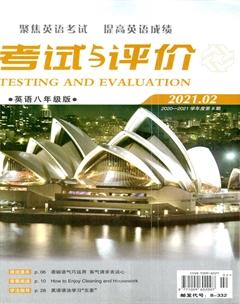Unit 3重点词语解读
曲永华
1. mess n. 杂乱;不整洁
“What a mess!” she said after the party. 聚会后她说:“真是一片狼藉!”
【拓展】 in a mess 乱七八糟;make a mess 弄脏;搞成一团糟
He found his room in a mess. 他发现自己的房间乱七八糟。
The kids made a mess in the living room. 孩子们把客厅搞得一塌糊涂。
2. neither adv. 既不……也不……
neither作副词,意为“两个都不;既不……也不……”,置于句首,表示前面否定的内容也适用于另一个人或物,句子须采用倒装语序。句式结构:neither + be/助动词/情态动词+主语。
For one week, she did not do any housework and neither did I. 一个星期,她没做任何家务,我也沒做。
Jack has never been to Shanghai and neither has Jim. 杰克从没去过上海,吉姆也没去过。
【拓展】 neither用法小结
(1) 作形容词
表示“(两者)都不”,置于单数名词之前,其修饰的词作主语时,谓语动词用单数。
Neither car is exactly what she wants. 这两辆车,哪一辆都不是她想要的。
(2) 作代词
作主语时谓语动词常用单数,常与of连用,neither of+名词复数。
Neither of the answers is right. 两个答案都不对。
(3) 作连词
常用短语neither... nor意为“既不……也不……”,连接两个并列成分,表示否定意义,连接并列主语时,谓语动词遵循“就近原则”。
Neither he nor I am good at swimming. 我和他都不擅长游泳。
【易错提醒】
(1) 表示“既……也……;两者都……”用both... and...连接并列成分,连接并列主语时,谓语动词用复数。
(2) 表示“或者……或者……(二者任选其一)”,用either... or。
(3) 表示“(三者以上)都不”,用none (of)。
3. lend v. 借给;借出
其后常跟双宾语,即lend sb. sth.意为“借给某人某物;把某物借给某人”。
Could you lend me some books? 你可以借给我一些书吗?
=Could you lend some books to me?
【拓展】 不同方式的“借”
(1) lend意为“借出”,是非延续性动词,表示主语把东西借给别人,常用结构:lend sb. sth.或lend sth. to sb.。
(2) borrow意为“借入”,是非延续性动词,表示主语向别人借东西,常用结构:borrow sth. from sb.。
(3) keep意为“借(多久)”,是延续性动词,表示“借某物多长时间”,与表示一段时间的时间状语连用。
4. while conj. 在……期间;当……的时候
while引导的从句中的动词必须是延续性动词。
Ill finish my homework while you help me with the dishes. 你帮我洗餐具时我将完成我的作业。
【拓展】 while用法小结
(1) 常用来引导时间状语从句,强调主句的动词和从句的动词所表示的动作或状态同时发生。
While I was doing my homework last night, my parents were watching TV. 昨天晚上我在做作业时,我的父母在看电视。
(2) 用作并列连词时,意为“然而”,表示对比。
Some people waste food while others dont have enough. 有些人浪费食物,然而有些人却没有足够的食物。
(3) 作名词,意为“一会儿;一段时间”。
We are off for a while. 我们要离开一会儿。
5. invite v. 邀请;招待
常用结构为:invite sb. to... 意为“邀请某人到某地/参加某项活动”; invite sb. to do sth.意为“邀请某人做某事”。
Thank you for inviting me to your house. 谢谢你邀请我去你家。
He wants to invite me to join the English club. 他想邀请我参加英语俱乐部。
6. provide v. 提供
provide sth. for sb.=provide sb. with sth. 为某人提供某物。
It is the parents job to provide a clean and comfortable environment at home for their children. 在家给孩子们提供一个干净、舒适的环境是家长们的事情。
The school provides the students with delicious food every day. 学校每天给学生提供美味的食物。
7. develop v. 发展
用作及物动词时,一般与into搭配,意为“发展成……”。
Doing chores helps to develop childrens independence and teaches them how to look after themselves. 做家务帮助培养孩子们的独立性并教会他们怎样去照顾自己。
develop还可意为“培养;养成;提高;成长”。
He developed an interest in science. 他养成了对科学的兴趣。
This course will help you develop your writing skills. 這门功课将帮助你提高写作技巧。
【拓展】 developed adj. 发达的;developing adj. 发展中的;developer n. 开发者;develop- ment n. 发展,开发
8. take out 带出去;取出;拿出;除掉
take out是由“动词+副词”构成的动词短语,名词作宾语时放在out前后都可以,代词作宾语时必须将其放在out前。
Please take out a piece of paper. 请拿出一张纸来。
=Please take a piece of paper out.
Please take it out. 请把它取出来。
【拓展】 常见take构成的短语:
take part in 参加;take care of 照顾;照看;take down 拆除;写下;take off 脱下;起飞;take lessons 上课
9. in surprise 吃惊地,惊讶地
“What happened?” she asked in surprise. 她惊讶地问道:“发生什么事情了?”
【拓展】 with也可与surprise搭配,with surprise与in surprise表达的意思相同。
Bills eyes widened with surprise when he saw how much the meal cost. 当比尔看到这顿饭的价钱时,他吃惊地瞪大了眼睛。
10. depend on / upon... 依靠;依赖;信赖;由……而决定
其后可跟名词、动名词、代词宾格以及宾语从句。
Children these days depend on their parents too much. 如今的孩子过多地依靠他们的父母。
The value of life does not depend on who you are, but what you do. 人生的价值并不取决于你是谁,而是你做了什么。
【拓展】 常用句式It all depends. 意为“一切要看情况而定。”
11. in order to 目的是;为了
后接动词原形,构成短语in order to do sth.,表示目的;其否定式结构为in order not to do sth. 意为“为了不做某事”。
They should spend their time on schoolwork in order to get good grades and get into a good university. 为了取得好成绩并进入一所好的大学,他们应该把时间花费在学业上。
He kept silent over the matter in order not to lose his job. 他对这件事保持沉默是为了不丢掉他的这份工作。
【拓展】 order用法小结
(1) order作名词,意为“命令;指示;顺序;订单”等。
Please put these shoes in order. 请把这些鞋子按顺序放好。
(2) order作动词,意为“命令;点(菜、饮料等);订(货);预订”等,后接名词作宾语。
I just want to order a glass of juice. 我只是想点一杯果汁。
(3) in order to / in order that表“目的”。
1) in order to意为“为了”,后接动词原形,用作目的状语。
2) in order that 意为“为了”,后接从句,引导目的状语从句。

